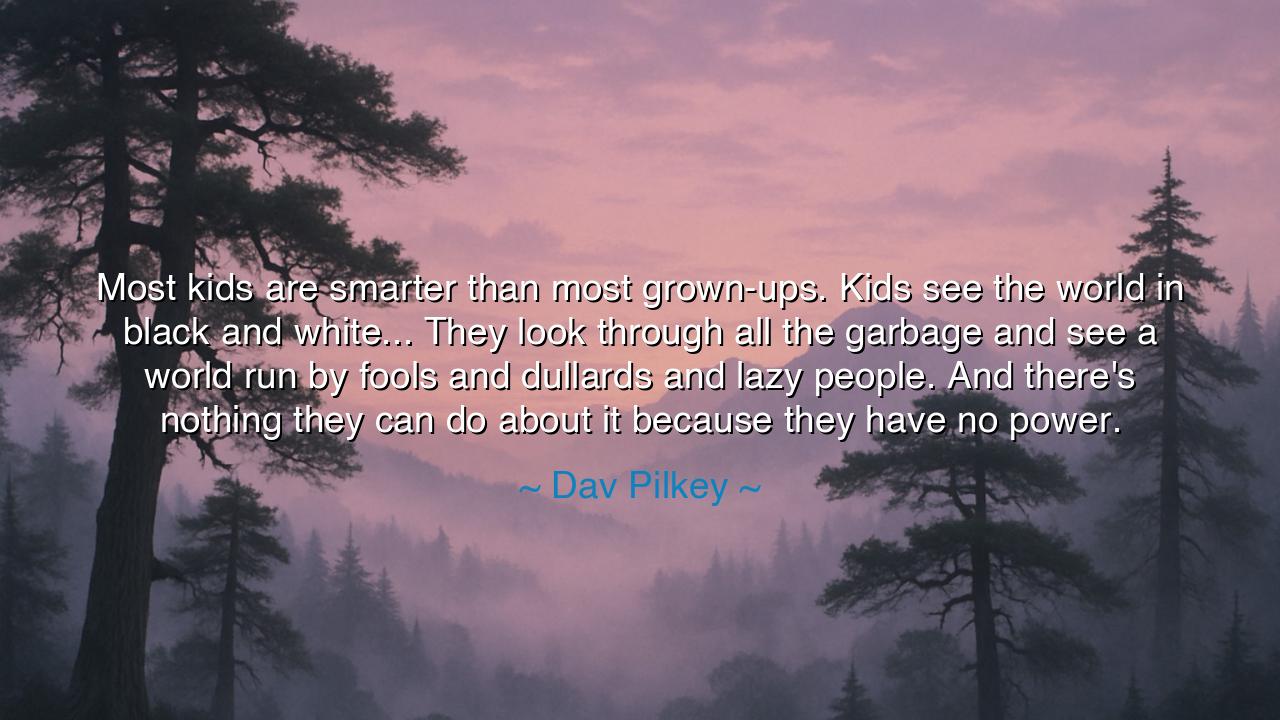
Most kids are smarter than most grown-ups. Kids see the world in
Most kids are smarter than most grown-ups. Kids see the world in black and white... They look through all the garbage and see a world run by fools and dullards and lazy people. And there's nothing they can do about it because they have no power.






In the words of Dav Pilkey—“Most kids are smarter than most grown-ups. Kids see the world in black and white... They look through all the garbage and see a world run by fools and dullards and lazy people. And there's nothing they can do about it because they have no power.”—there is a cry both innocent and piercing. He declares that children, though powerless in society, often hold a vision clearer than their elders. Free of cunning, corruption, and compromise, they perceive truth in its sharp outlines, unsoftened by excuses. Their tragedy is not blindness, but helplessness: they see the folly of the world, yet lack the power to change it.
The ancients often placed wisdom in the mouths of children. In the Scriptures, it was the boy Samuel who first heard the voice of God in the night, though Eli, the aged priest, had grown deaf to it. The message is the same: that the innocent eye may see what the jaded cannot. Pilkey reminds us that youth is not a defect, but a kind of unclouded vision, one that perceives folly for what it is without the layers of self-deception adults have woven.
Yet the sorrow lies in impotence. Children may know, but they cannot act. They see hypocrisy in leaders, foolishness in rules, laziness in those who hold authority—but their voices are small, ignored, and without weight. The philosopher Plato, in his Republic, warned that the just city must educate its young wisely, for the soul of the child sees more keenly, and if left unheeded, that vision may turn to bitterness. Pilkey’s lament echoes this: that truth lies in the young, but the reigns of society rest in the hands of the old.
History bears this out. When the Children’s Crusade of 1212 rose, thousands of youths marched believing they could reclaim the Holy Land through purity of faith. They saw the corruption of their elders’ wars and sought a truer path. Yet, powerless and unprotected, they were exploited and scattered. Their clarity of vision could not withstand the weight of a world that dismissed them. It was not their innocence that failed, but their lack of power.
Thus, let this wisdom endure: to dismiss the sight of children is to lose the truest mirror of ourselves. For they are not blinded by ambition or dulled by habit. They see the foolishness of the world plainly, even if they cannot alter it. It falls to those with power to listen, to guard that clarity, and to act with the courage that children would, if only they could. For often it is the powerless who hold the purest vision of truth.






AAdministratorAdministrator
Welcome, honored guests. Please leave a comment, we will respond soon